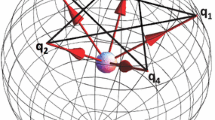Abstract
Recent years have seen new general notions of contextuality emerge. Most of these employ context-independent symbols to represent random variables in different contexts. As an example, the operational theory of (Spekkens in Phys Rev A 71(5):52108, 2005) treats an observable being measured in two different contexts identically. Non-contextuality in this approach is the impossibility of drawing ontological distinctions between identical elements of the operational theory. However, a recent collection of work seeks to exploit context-dependent symbols of random variables to interpret contextuality (Kujala et al. in Phys Rev Lett 115(15):150401, 2015; Dzhafarov and Kujala in Phys Scr T163:014009, 2014). This approach associates contextuality with the possibility of imposing a particular joint distribution on random variables recorded under different experimental contexts. This paper compares these two different treatments of random variables and highlights the limitations of the context-dependent approach as a physical theory.

Similar content being viewed by others
Notes
For simplicity, from now on we will use \(a_{i}^{j}\) instead of \(a_{q_{i}}^{c_{j}}\), where subscripts i indicate different observables and j indicate different contexts.
It is clear that one can check whether the two random variables \(a_{\mathbb {A}_{1}}^{(\mathbb {A}_{1}, \mathbb {B}_{1})}\) and \(a_{\mathbb {A}_{1}}^{(\mathbb {A}_{1}, \mathbb {B}_{2})}\) have the same distribution only when they have a same value.
References
Spekkens, R.W.: Contextuality for preparations, transformations, and unsharp measurements. Phys. Rev. A 71(5), 52108 (2005)
Kujala, J.V., Dzhafarov, E.N., Larsson, J.-Å.: Necessary and sufficient conditions for an extended noncontextuality in a broad class of quantum mechanical systems. Phys. Rev. Lett. 115(15), 150401 (2015)
Dzhafarov, E.N., Kujala, J.V.: Contextuality is about identity of random variables. Phys. Scr. T163, 014009 (2014)
Kochen, K., Specker, E.P.: The problem of hidden variables in quantum mechanics. In: The Logico-Algebraic Approach to Quantum Mechanics, pp. 293–328 (1967)
Abramsky, S., Brandenburger, A.: The sheaf-theoretic structure of non-locality and contextuality. New J. Phys. 13(11), 113036 (2011)
Cabello, A., Severini, S., Winter, A.: Graph-theoretic approach to quantum correlations. Phys. Rev. Lett. 112(4), 040401 (2014)
Acín, A., Fritz, T., Leverrier, A., Sainz, A.: A combinatorial approach to nonlocality and contextuality. Commun. Math. Phys. 334(2), 533–628 (2015)
Mazurek, M.D., Pusey, M.F., Kunjwal, R., Resch, K.J., Spekkens, R.W.: An experimental test of noncontextuality without unphysical idealizations. Nat. Commun. 7, 11780 (2016)
Fine, A.: Hidden variables, joint probability, and the bell inequalities. Phys. Rev. Lett. 48(5), 291 (1982)
Dzhafarov, E.N., Kujala, J.V.: Context-content systems of random variables: the contextuality-by-default theory. J. Math. Psychol. 74, 11–33 (2016)
Dzhafarov, E.N., Kujala, J.V., Larsson, J.-Å.: Contextuality-by-default: a brief overview of ideas, concepts, and terminology. In: Atmanspacher, H., Filk, T., Pothos, E., (eds.), Quantum Interaction: 9th International Conference, QI 2015, Filzbach, Switzerland, July 15–17, 2015, Revised Selected Papers, pp. 12–23. Springer International Publishing (2016)
Dzhafarov, E.N., Kujala, J.V.: Selectivity in probabilistic causality: where psychology runs into quantum physics. J. Math. Psychol. 56(1), 54–63 (2012)
Shimony, A.: Contextual hidden variables theories and Bell’s inequalities. Br. J. Philos. Sci. 35(1), 25–45 (1984)
Dzhafarov, E.N., Kon, M.: On universality of classical probability with contextually labeled random variables. J. Math. Psychol. 85, 17–24 (2018)
de Barros, J.A., Kujala, A., Oas, G.: Negative probabilities and contextuality. J. Math. Psychol. 74, 34–45 (2016)
Simmons, A.W., Wallman, J.J., Pashayan, H., Bartlett, S.D., Rudolph, T.: Contextuality under weak assumptions related content. New J. Phys. 19(3), 033030 (2017)
Jarrett, J.P.: On the physical significance of the locality conditions in the Bell arguments. Noûs 18(4), 569 (1984)
Shimony, A.: Controllable and uncontrollable non-locality. Found. Quantum Mech. Light New Technol. 225–230 (1984)
Maudlin, T.: Quantum Non-Locality and Relativity: Metaphysical Intimations of Modern Physics. Wiley, New York (2011)
Brask, J.B., Chaves, R.: Bell scenarios with communication. J. Phys. A 50(9), 094001 (2017)
Liang, Y.-C., Spekkens, R.W., Wiseman, H.M.: Specker’s parable of the overprotective seer: a road to contextuality, nonlocality and complementarity. Phys. Rep. 506(1), 1–39 (2011)
Kunjwal, R.: Contextuality beyond the Kochen-Specker theorem. PhD thesis, The Institute of Mathematical Sciences, Chennai (2016)
Specker, E.: Die Logik Nicht Gleichzeitig Entscheidbarer Aussagen. In: Ernst Specker Selecta, Birkhäuser Basel, pp. 175–182 (1990)
Kunjwal, R., Ghosh, S.: Minimal state-dependent proof of measurement contextuality for a qubit. Phys. Rev. A 89(4), 042118 (2014)
Dzhafarov, E.N., Kujala, J.V., Larsson, J.-Å.: Contextuality in three types of quantum-mechanical systems. Found. Phys. 45(7), 762–782 (2015)
Leggett, A.J., Garg, A.: Quantum mechanics versus macroscopic realism: is the flux there when nobody looks? Phys. Rev. Lett. 54(9), 857–860 (1985)
Kunjwal, R., Heunen, C., Fritz, T.: Quantum realization of arbitrary joint measurability structures. Phys. Rev. A 89(5), 052126 (2014)
Author information
Authors and Affiliations
Corresponding author
Additional information
Publisher's Note
Springer Nature remains neutral with regard to jurisdictional claims in published maps and institutional affiliations.
Rights and permissions
About this article
Cite this article
Aliakbarzadeh, M., Kitto, K. Is contextuality about the identity of random variables?. Found Phys 51, 14 (2021). https://doi.org/10.1007/s10701-021-00402-7
Received:
Accepted:
Published:
DOI: https://doi.org/10.1007/s10701-021-00402-7




